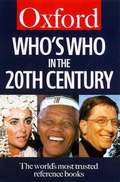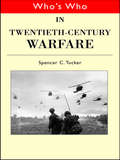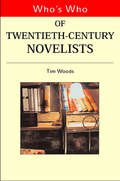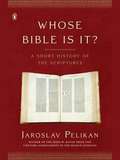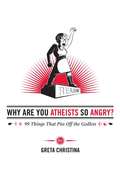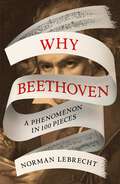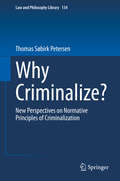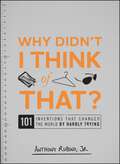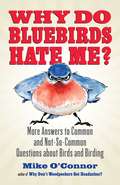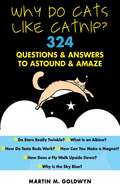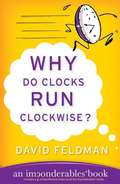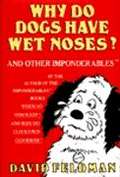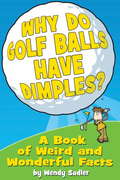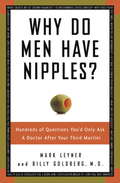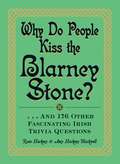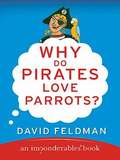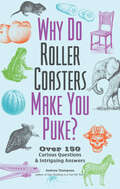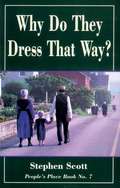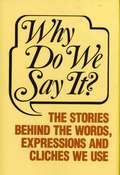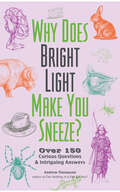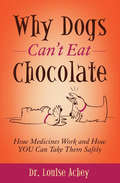- Table View
- List View
Who's Who in the Twentieth Century
by Jonathan Law Alan Isaacs Elizabeth MartinFrom Albert Einstein to the Marx Brothers, this authoritative reference book provides 2000 biographies of men and women from different countries and cultures who have contributed to the thought as well as the action of the twentieth century. For anyone seeking clear and accurate information on the leading figures of this century, it is an essential work of reference. Biographies of 2,000 famous men and women of this century Leading figures from politics, religion, science, literature, medicine, cinema, sport, and many other fields of human activity Worldwide coverage, spanning all countries and cultures. Authoritative entries written in a clear and accessible style. Up-to-date and reliable information. Ideal for browsing. An essential work of reference
Who's Who in Twentieth Century Warfare
by Spencer TuckerThis authoritative biographical guide to warfare in the twentieth century is at once fascinating reading and an invaluable work of reference for anyone interested in modern military history. As well as the First and Second World Wars, this Who's Who takes in key figures from conflicts in Vietnam, Korea and others. Those whose lives and careers are covered here include not only major military leaders, but also politicians, inventors and other key public figures central to the course of twentieth-century military history. From Che Guevara to Mao Zhedong, from Albert Speer to Norman Schwarzkopf, and from Josef Stalin to Charles de Gaulle - this volume's breadth of coverage makes it a unique and indispensable guide to an important and absorbing element of modern history.
Who’s Who of Indian Writers1999: Volumes I and II
by K. C. DuttA directory of great Indian Writers in Literature, Fiction and Poems.
Who's Who of Sanskrit Scholars in India, 1991
by K. C. DuttThere are thousands of eminent living practitioners in the various fields of classical learning scattered through the length and breadth of India from north to south, and east to west, whose lingua franca of intellectual discourse is Sanskrit and who converse with each other on the subtlest issues with as great a sophistication and erudition as their counterparts in this country do in hundreds of the seminars that are organised around the country each year and where only those who have proficiency in writing and speaking English, participate and discuss in a world whose terms of intellectual discourse have little to do with those which were developed in the country over millennia by some of the greatest minds the world has ever seen in the long period of its history up till now.
Who's Who of Twentieth Century Novelists: Null
by Tim WoodsTaking in novelists from all over the globe, from the beginning of the century to the present day, this is the most comprehensive survey of the leading lights of twentieth century fiction. Superb breadth of coverage and over 800 entries by an international team of contributors ensures that this fascinating and wide-ranging work of reference will be invaluable to anyone with an interest in modern fiction. Authors included range from Joseph Conrad to Albert Camus and Franz Kafka to Chinua Achebe. Who's Who of Twentieth Century Novelists gives a superb insight into the richness and diversity of the twentieth century novel.
Whose Bible Is It?
by Jaroslav PelikanJaroslav Pelikan, widely regarded as one of the most distinguished historians of our day, now provides a clear and engaging account of the Bible's journey from oral narrative to Hebrew and Greek text to today's countless editions. Pelikan explores the evolution of the Jewish, Protestant, and Catholic versions and the development of the printing press and its effect on the Reformation, the translation into modern languages, and varying schools of critical scholarship. Whose Bible Is It? is a triumph of scholarship that is also a pleasure to read. "An engaging and highly readable survey of biblical scholarship that tells a fascinating and complex story. " -The Wall Street Journal"A crisp, remarkably succinct history of the Bible as preserved, interpreted, translated and canonized by the various faiths that believe in it. " -Los Angeles Times"Engaging . . . an excellent overview. " -The New York Times Book Review"Outstanding . . . Pelikan takes the reader through the process of scripture building with a fluency and ease that is both accessible and understandable. " -Publishers Weekly (starred review)"Masterly . . . Pelikan weaves a tapestry of the power of the Word to mold religious communities, nations, and culture. . . . Engaging, concise, and highly readable. " -The Christian Science Monitor
Why Are You Atheists So Angry?: 99 Things That Piss Off The Godless
by Greta ChristinaWhy are atheists angry? Is it because they're selfish, joyless, lacking in meaning, and alienated from God? Or is it because they have legitimate reasons to be angry--and are ready to do something about it? Armed with passionate outrage, absurdist humor, and calm intelligence, popular blogger Greta Christina makes a powerful case for outspoken atheist activism, and explains the empathy and justice that drive it. This accessible, personal, down-to-earth book speaks not only to atheists, but also to believers who want to understand the so-called new atheism. Why Are You Atheists So Angry? drops a bombshell on the destructive force of religious faith—and gives a voice to millions of angry atheists.
Why Beethoven: A Phenomenon in 100 Pieces
by Norman LebrechtWithout Beethoven, music as we know it wouldn&’t exist. Who was this titan of world culture? 'You want to build a Beethoven library? There can be no better starting point... Brilliant.' John Suchet, Classic FM presenter Through 100 recordings, Lebrecht brings to life the composer as we&’ve never seen him before. Unruly, offensive and hopeless in so much of his life, yes, but driven to a fault and devoted to his art, conquering deafness to compose some of the towering works of our culture. Along the way, we encounter the great musicians who have taken on the challenge of Beethoven, in all their glories and foibles. In this revealing, unique biography, Beethoven emerges as a cornerstone of the modern world. All recordings are freely available on Idagio and YouTube.
Why Criminalize?: New Perspectives on Normative Principles of Criminalization (Law and Philosophy Library #134)
by Thomas Søbirk PetersenThe book defines and critically discusses the following five principles: the harm principle, legal paternalism, the offense principle, legal moralism and the dignity principle of criminalization. The book argues that all five principles raise important problems that point to rejections (or at least a rethink) of standard principles of criminalization. The book shows that one of the reasons why we should reject or revise standard principles of criminalization is that even the most plausible versions of the harm principle and legal paternalism that have been offered so far are rendered redundant by general moral theories. Furthermore, it demonstrates that the other three principles (or versions thereof), the offense principle, legal moralism and the dignity principle of criminalization, can either be covered by the harm principle, thus making these principles also redundant, or be seen to have what look like other unacceptable implications (e.g. that versions of legal moralism are based on speculative and incorrect empirical assumptions or violate what is called the criminological levelling-down challenge). As such, there is reason to move beyond traditional principles of criminalization, and instead to investigate alternative principles the state should be guided by when attempting to justify which kinds of conduct should be criminalized. Moreover, this book presents and defends such a principle – the utilitarian principle of criminalization.
Why Didn't I Think of That?: 101 Inventions that Changed the World by Hardly Trying
by Anthony Rubino Jr.Why Didn't I Think of That? proves not all successful inventions are the greatest thing since sliced bread (not even sliced bread, which is literally just a precut loaf for lazy loafs). This humorous guide to “mind-blowing” inventions deconstructs just how complex these can't-live-without necessities really are, while providing some insightful(ly funny) lessons to future inventors, such as:Yo-yos: Deadly weapons do make great kids' toys.Soccer: Boredom is the stepmother of invention.Bottled water: There is no such thing as a stupid idea.Complete with useful trivia--like the fact that 100 trillion paperclips have been sold--readers will be able to impress their friends by hardly trying.
Why Do Bluebirds Hate Me?: More Answers to Common and Not-So-Common Questions about Birds and Birding
by Mike O'ConnorA collection of humorous Q&As about everything you've always wanted to ask about birds and birding Mike O'Connor knows bird watchers as well as he knows birds. He knows that if you're even slightly interested in identifying birds or attracting them to your backyard with a feeder, then you've also had your share of strange and silly questions about birds and their sometimes inexplicable behavior. In Why Do Bluebirds Hate Me?, O'Connor applies his deep knowledge of all things avian to answer the questions that keep birders up at night. Questions like · Should you clean your birdhouses? · Do swallows have a feather fetish? · How much does it cost to run a heated birdbath? · Is drinking coffee bad for birds? Other questions O'Connor covers range from the practical (Should I rotate the seed in my feeder?) to the quirky (Why are vultures eating my vinyl screen door?) to the just plain adorable (Are those birds kissing or feeding each other?). And he also explains why bluebirds just don't seem to like some people.From the Trade Paperback edition.
Why Do Cats Like Catnip?: 324 Questions and Answers to Astound and Amaze
by Matrin M. GoldwynHave you ever wondered how the planets came into being? Or what causes some people to have freckles? Ever wanted to know why mosquito bites itch and swell? Over his long career as a high school science teacher, Martin M. Goldwyn kept track of the smartest, most challenging questions his students ever asked him. <P><P>Now the answers are all in your hands: What is the oldest living thing on the planet? Do fish ever go to sleep? What exactly is a brain wave? Can a single tree grow more than one kind of fruit? What causes people to have nightmares? Illustrated with original cartoons by Ted Enik, this book will have curious readers of all ages laughing and learning with every turn of the page.
Why Do Clocks Run Clockwise?
by David FeldmanPonder, if you will ... What is the difference between a kit and a caboodle? Why don't people get goose bumps on their faces? Where do houseflies go in the winter? What causes that ringing sound in your ears? Pop-culture guru David Feldman demystifies these topics and so much more in Why Do Clocks Run Clockwise? -- the unchallenged source of answers to civilization's most nagging questions. Part of the Imponderables® series and charmingly illustrated by Kassie Schwan, Why Do Clocks Run Clockwise? challenges readers with the knowledge about everyday life that encyclopedias, dictionaries, and almanacs just don't have. And think about it, where else are you going to get to the bottom of why hot dogs come ten to a package while hot dog buns come in eights?
Why Do Dogs Have Wet Noses? and Other Imponderables of Everyday Life
by David FeldmanA collection of answers to those questions that millions of fans recognize immediately as 'imponderables' such as: why are gondolas black? why are peaches fuzzy? how do kangaroos clean their pouches? and many more
Why Do Dogs Like Balls?: More Than 200 Canine Quirks, Curiosities, and Conundrums Revealed
by D. Caroline Coile Margaret H. BonhamDo dogs believe pictures of dogs are real? Why do dogs turn in a circle before they lie down? Can you trust someone your dog hates? Dog owners have questions; here are the answers to more than 200 of them, provided by two of the most knowledgeable writers in the field. Fun to read, eye-opening, and filled with important facts that every fan of Fido should know, it encompasses topics ranging from doggie intelligence (Can dogs learn to read?) to canine behavior, body, and senses (Can a dog sniff out cancer?). Find out if blind dogs are sad, whether dogs should be allowed to roam, why they lick you, and why they wag their tails. You'll gain a better, deeper understanding of your best friend.
Why Do Golf Balls Have Dimples?: A Book of Weird and Wonderful Science Facts
by Wendy SadlerHave you ever wondered why golf balls have dimples or why your hair goes frizzy in the rain? Scientist Wendy Sadler has the answers in her book of Weird and Wonderful facts. Broken down into user-friendly chapters like sport, going out, the great outdoors, food and drink and the downright weird, Wendy gives the scientific answers to life's intriguing questions, likeWhy toast always lands butter side downWhy you can't get (too) lost with a satnav.
Why Do Men Have Nipples?: Hundreds Of Questions You'd Only Ask A Doctor After Your Third Martini
by Billy Goldberg Mark LeynerIs There a Doctor in the House?Say you're at a party. You've had a martini or three, and you mingle through the crowd, wondering how long you need to stay before going out for pizza. Suddenly you're introduced to someone new, Dr. Nice Tomeetya. You forget the pizza. Now is the perfect time to bring up all those strange questions you'd like to ask during an office visit with your own doctor but haven't had the guts (or more likely the time) to do so. You're filled with liquid courage . . . now is your chance! If you've ever wanted to ask a doctor . . .*How do people in wheelchairs have sex?*Why do I get a killer headache when I suck down my milkshake too fast?*Can I lose my contact lens inside my head forever?*Why does asparagus make my pee smell?*Why do old people grow hair on their ears?*Is the old adage "beer before liquor, never sicker, liquor before beer . . ." really true? . . . then Why Do Men Have Nipples? is the book for you.Compiled by Billy Goldberg, an emergency medicine physician, and Mark Leyner, bestselling author and well-known satirist, Why Do Men Have Nipples? offers real factual and really funny answers to some of the big questions about the oddities of our bodies.From the Trade Paperback edition.
Why Do People Kiss the Blarney Stone?: And 176 Other Fascinating Irish Trivia Questions
by Ryan Hackney Amy Hackney BlackwellFáilte!Brew yourself a cuppa and settle in to discover...Why Do People Kiss the Blarney Stone? It's the closest you can feel to the Emerald Isle without boarding a plane! You'll tickle your noggin with spirited questions, including:How did a white bull start a war? What is Brian Boru's connection to Guinness? Why was 1847 known as Black '47? Where does peat come from? What's so special about the Book of Kells?This terrific little tome provides the answers to those questions and many more. With information on Irish history, mythology, and culture, you'll be able to go on and on about anything and everything about The Old Sod.
Why Do Pirates Love Parrots?
by David FeldmanAre you the type of person who stays up nights wondering how they get the paper tag into Hershey's Kisses? Or why portholes are round? Even if you don't lose sleep over such matters, you have to admit that such questions are, well, worthy of consideration. Here, from David Feldman, creator of the Imponderables® series, are the latest questions on the minds of his devoted readers and fans. No question from his readers is too small or obscure for Feldman to tackle. From the return of red M&Ms (they are back, if you've missed it) to new-car smell, the answers to life's little mysteries are dissected in these pages. Although it's all done in great fun, there is also an educational edge to the answers, as Feldman ferrets out top experts in diverse fields to come up with his entertaining answers. And their answers may surprise you-from the detailed physics involved in why cans of Diet Coke float but regular Coke doesn't, all the way to why they put crinkly paper into pairs of men's socks (but only one sock, not both). Complete with drawings by longtime Imponderables® illustrator Kassie Schwan, and a special section updating answers to questions in previous books in the series, this eleventh book of Imponderables® is sure to entertain the thousands of Feldman fans who have purchased over 2 million copies to date. Prepare to be delighted!
Why Do Roller Coasters Make You Puke: Over 150 Curious Questions and Intriguing Answers (Fascinating Bathroom Readers)
by Andrew ThompsonA fun and fascinating trivia book with a wide range of intriguing questions and entertainingly written answers from a bestselling author.Perfect for trivia junkies everywhere, this new collection will surprise readers with fascinating answers to age-old curiosities, such as:• Does a goldfish's memory really only last a few seconds?• Do plants feel pain?• Why do cats' eyes glow in the dark?• Why do people seem more attractive when we're drunk?• Why didn't people smile in old photos?Each page offers another witty response to the questions of our time. From men's fashion to the meaning of life, from the educational to the entertaining, this book has something for everyone.
Why Do They Dress That Way?: People's Place Book No. 7
by Stephen ScottThis unique book, by a man who has chosen to "dress plain," describes the history and use of hats, bonnets, dresses, overcoats, and other articles of clothing used by the various religious groups who wear plain garb. This is the first comprehensive book about why more than 150,000 persons in North America wear plain clothes for religious reasons. Who are the various people who dress plain? Where do they live? Why do they do it? Where did the plain pattern come from? Don't they ever change? Answers to some common objects to plain dress! Will plain dress survive? Authoritative, yet gentle in tone, this book will be of interest to many readers.
Why Do We Say It?: The Stories Behind the Words, Expressions and Cliches We Use
by Castle BooksTHE STORIES BEHIND THE WORDS, EXPRESSIONS AND CLICHES WE USE. How did lollipops get their name? What's long about a longshoreman? Why do we pass the buck? The answers are in this fascinating volume. The intriguing origins of hundreds of unusual words and expressions are here, organized in a handy alphabetical format. Useful for reference and fun just for browsing, Why Do We Say It? is also a great way to expand your vocabulary and enjoy doing it.
Why Does Asparagus Make Your Pee Smell?: Fascinating Food Trivia Explained with Science (Fascinating Bathroom Readers)
by Andy BrunningFOOD QUESTIONS ANSWERED WITH COLORFUL GRAPHICS AND FUN, EASY-TO-UNDERSTAND SCIENTIFIC EXPLANATIONSHave you ever wondered...• Why bacon smells so good?• Why onions make you cry?• If eating turkey makes you sleepy?• If mixing drinks makes a hangover worse?• How energy drinks work?• Why chocolate is poisonous to dogs?• Why coffee makes you more wired than tea?• Why cilantro tastes soapy to some?The answers to these baffling questions and more are revealed in this friendly, informative collection of trivia. Not a scientist? No problem. This book&’s colorful graphics and easy-to-understand explanations make these food facts fun for everyone.
Why Does Bright Light Make You Sneeze?: Over 150 Curious Questions & Intriguing Answers (Fascinating Bathroom Readers)
by Andrew ThompsonMore than 150 new fun facts to delight, befuddle and amaze, from the bestselling author of Why Do Roller Coasters Make You Puke? This bizarre and baffling trivia collection with delight and intrigue readers, with answers to age-old questions like who was Dr. Pepper and what causes new-car smell? Written by the bestselling author of Can Holding in a Fart Kill You?, this new collection has 150 more curious questions and astounding answers. Perfect for any trivia junkie or fun fact connoisseur, this jam-packed book explains the answers to the questions you’ve always wondered, like why dogs have wet noses, why tornados never hit big cities, if vegetarians live longer, if it’s bad to “crack” your knuckles, and much more.
Why Dogs Can't Eat Chocolate: How Medicines Work and How You Can Take Them Safely
by Dr. Louise AcheyA pharmacist explains the science behind prescription medications—with helpful hints for avoiding adverse reactions and side effects. If you are one of the millions who take at least one prescription drug regularly, how can you stay safe when their effects can be so unpredictable—and occasionally even dangerous? Just as chocolate has a very different effect on your dog than it does on you, prescription drugs don&’t always work the same from person to person. In this book, a pharmacist and award-winning medical educator simplifies the complex and confusing information about pharmaceuticals, reveals the three &“Ds&” of taking medicine safely, and explains in a clear and entertaining way what happens in our bodies when we take a medicine or supplement—to help you make safer, smarter choices for your own health.
